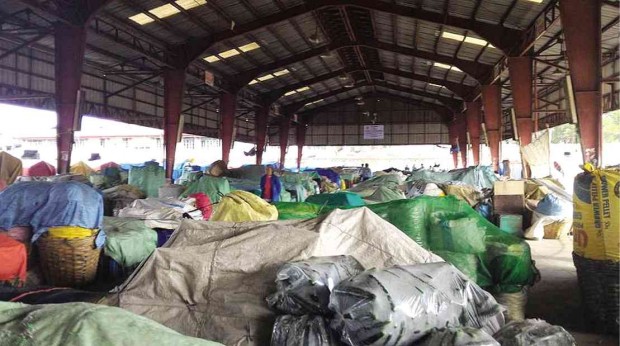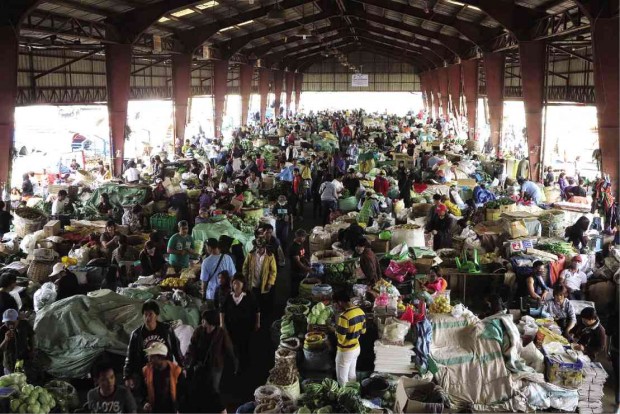Traders’ protest delays delivery of veggies

POST PROTEST The vegetable trading post of Benguet’s La Trinidad town suspended operations from 7 to 9 a.m. on Monday when its occupants staged a protest march to resist an eviction order to be imposed today. Operations resumed when its occupants won a 20-day freeze order from a court that shields them from eviction until March 20.AYA BALANOY/CONTRIBUTOR
LA TRINIDAD, Benguet—Deliveries of salad vegetables to Metro Manila markets were delayed on Monday when the town’s primary vegetable trading post suspended operations for two hours to protest an order that would force traders and truckers to do business in a new trading center that opened last year.
The order, which was supposed to take effect today, would direct vegetable traders, truckers, porters and retailers to vacate the trading post and relocate to Benguet Agri Pinoy Trading Center (BAPTC), the biggest of 22 trading facilities developed by the Department of Agriculture (DA).
The BAPTC offers a trading system that would keep prices fair and stable while increasing the revenues of farmers, Agriculture Secretary Proceso Alcala had said in an earlier interview.
The protesters stormed the Hall of Justice here on Monday morning and were granted a 20-day freeze order by a regional trial court that prevented La Trinidad Mayor Edna Tabanda from implementing the eviction.
Augusta Balanoy, manager of Benguet Farmers Marketing Cooperative, said trading resumed at 9:20 a.m. on Monday. But vegetable deliveries that should have arrived in Metro Manila at 5 p.m. came three hours later, disrupting the day’s supply-and-demand situation.
Article continues after this advertisementBenguet farms supply most of the salad vegetable needs of lowland markets, including those in Metro Manila. Each day, up to 1.2 tons (1,089 kg) of vegetables are shipped from the trading post here.
Article continues after this advertisementThe delays were unfortunate, traders and truckers here said. But they said the eviction order was forcing them to transact business at the BAPTC, where, they noted, vegetable trading had been slow since its soft opening last year.
According to the petition filed by the traders’ lawyer, Pablito Sanidad, the closure of the old trading post would require the repeal of a 2009 ordinance that set the rules for its operation.
When asked at a news conference on Monday, DA officials in the Cordillera said the agency did not ask the municipal government to shut down the trading post.
But Danilo Daguio, DA Cordillera assistant director, said a study had suggested that closing the old trading post would be ideal for BAPTC to function properly, noting that only a few farmers had been using it to sell vegetables.
“They bring in vegetables [in volumes] that are not enough for the daily requirements of buyers [because] more vegetables are sold at the [old trading post],” Daguio said.
“We informed the [local government] that the full operation [of BAPTC] needs the closure of the old facility,” he said.
A manifesto signed by 89 accredited farmers’ groups supported Tabanda’s decision to close the old trading post. These groups represent 20,538 farmers who would benefit from a systematic trading.
“We manifest our strong desire for a change in the vegetable trading system and BAPTC has given us renewed hope [of improving] our living standards through a more systematic vegetable trading system,” the manifesto said.
Daguio said those opposing the transfer to the BAPTC had misunderstood the services and fees of the new trading post. For instance, the facility would charge a 25-centavo trading fee for each kilo of vegetables transacted at the BAPTC. The fees would be used for its maintenance and salaries of its employees, Daguio said.
The BAPTC is getting a P30-million subsidy from the DA that would last until June, but it had earned not more than P100,000 in less than six months that it had operated.
Daguio said the BAPTC would also offer rebates. The fee would drop when each association brings in a huge volume of produce. For 450 tons (408,233 kg) of vegetables that farmers turn in at the new post, they would be charged only 15 centavos a kilo, he said.
